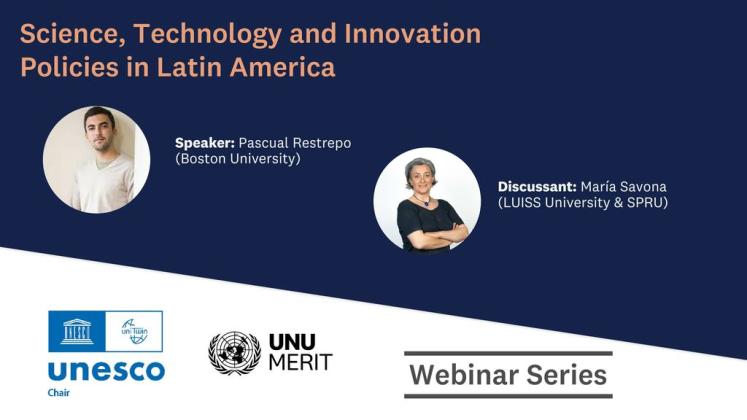In the second webinar of the UNESCO Chair series on 'Science, Technology and Innovation Policies for Sustainable Development in Latin America', Dr. Pascual Restrepo (Assistant Professor of Economics at Boston University) gave a presentation on the 'Origins and implications of the current wave of automation technologies'.
Dr. Maria Savona, Professor of Economics of Innovation at SPRU & Professor of Applied Economics at LUISS University, acted as a discussant. The seminar was held on 14 March 2023, and after the presentation, Prof. Dr. Carlo Pietrobelli from UNU-MERIT's UNESCO Chair team interviewed the speakers. Pietrobelli asked key questions on the following topics, which you can read or listen back to here below:
Carlo Pietrobelli: How do you incorporate the unique demographic qualities of Latin America, such as high degrees of income inequality, generally lower level of human capital, into your predictions about automation's effects on employment and labour share of GDP?
Pascual Restrepo: I think that the unique demographic structure in Latin America, where in particular wages and labour costs are still low because of the abundance of labour, implies that –at least in the short run– the adoption of many of these automation technologies is going to be limited in practice. But having said that, there are also many important indirect channels to which technological change in developed countries can affect and will probably affect Latin America. Some of these channels include the reduced potential to adopt technologies created abroad. Just because these technologies might be increasingly inappropriate for the types of demographic structure in Latin America. Now that developed countries have the alternative to produce many tasks in-house and do not need to offshore those tasks, another channel might be more challenging time for Latin American countries to insert themselves into global value chains, or to retain a key position in the global value chains. And a final channel has to do with the importance of foreign direct investment to send a strategy to increase employment. That is going to become less likely if in the future, foreign direct investment involves creation of mostly automated plants which generate little to no local employment.
Carlo Pietrobelli: Maria, what challenges do new technology and automation pose to the development of Latin American countries?
María Savona: There are several issues. For example, the Latin American population is much younger and this can be a good leverage to support, for example, inventions and technology solutions for local structure. I think is important also to redirect innovation policy towards the specificities of of the population. Regardless the usual suspects, things about skills and so on. So something that actually support entrepreneurship or inventions for specific needs. I would probably leverage on what are the comparative advantages, the unusual comparative advantages of Latin American countries in this context. In agriculture is huge, is a huge issue that has been going through a lot of automation. I'm calling for more research on that, on automation in agriculture.
Carlo Pietrobelli: Which types of policies do you think should take priority in Latin America?
Pascual Restrepo: There are two types of policies that I think are going to be important in a world that is becoming increasingly automated; the first strategy is to start policies for science and technology. Whether we want to continue with the paradigm of just relying on technological transfers and learning from developments from abroad or whether there's a case for using this particular time as an opportunity to start creating technologies that are better suited for our particular problems. And the other type of policies that I think could be important in the future are educational policies. I think that educational policies are going to have two benefits. The first one is that, independently of what types of technologies you think that your country should be adopting, having a more educated population is going to be beneficial for the adoption of technology. And second, education can be a remedy against the displacement effect that I mentioned earlier. In particular the displacement effect, the reason why it can be so or why it can have adverse consequences for some workers is just because they do not have the skills or the education needed to perform the tasks that are not getting automated. And so equipping workers with those skills seems like an important challenge, not only in developing countries in the future, but also for developed countries today.
Carlo Pietrobelli: Maria, what kind of adaptation would be necessary to make Latin American labour markets face the challenges of automation technologies?
María Savona: My perception of Latin American countries, for example, as I said, is not only that population is younger, but also that there's a lot of ferment in terms, for example, of creative industries. And this is where possibly human interaction and the human factor is actually more important. I'm not saying that these will resolve these issues because the factor of production in manufacturing is possibly a necessary condition. But I also think that if there's a large labour pool that is able to contribute to creative industries. This could be actually a way to rethink innovation policies that goes beyond the effect of replacing tasks out of automation, but also to create new jobs in industries that are possibly not not yet affected totally or replaced totally by automation. I'm thinking aloud here, but I think this is important also beyond Latin American countries. I think that these are issues that have been discussed also very recently and I think it's worth, again, increasing research on these particular sectors.
Recording of the full webinar
Missed out on this session? Here's a recorded version:


